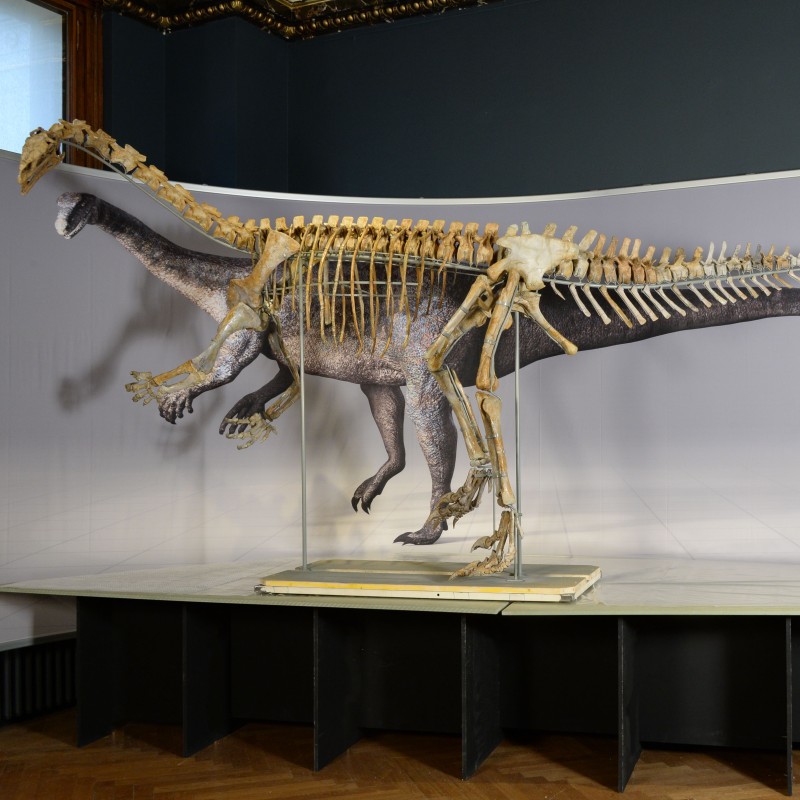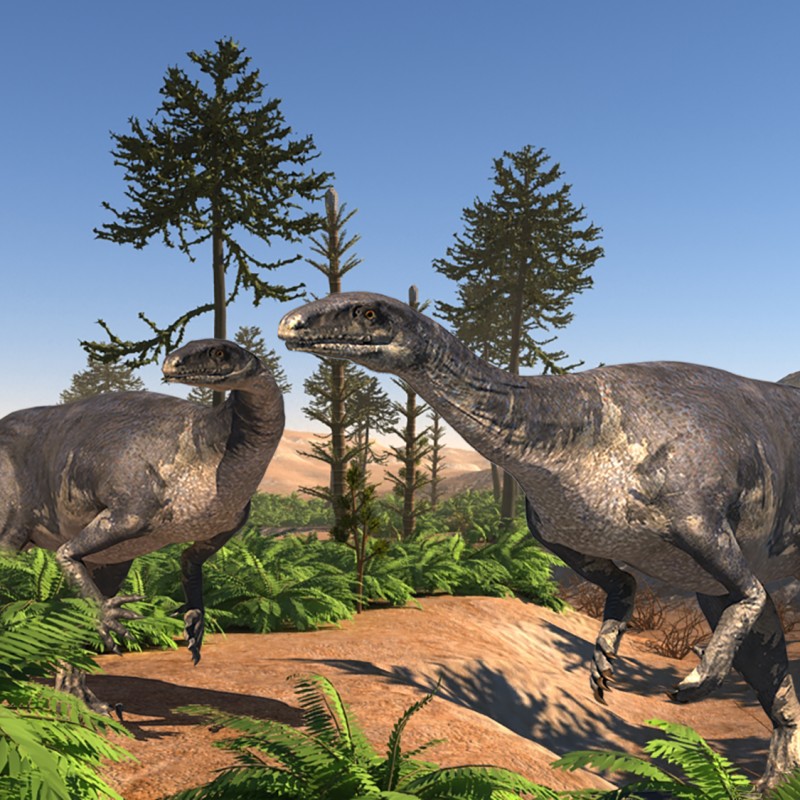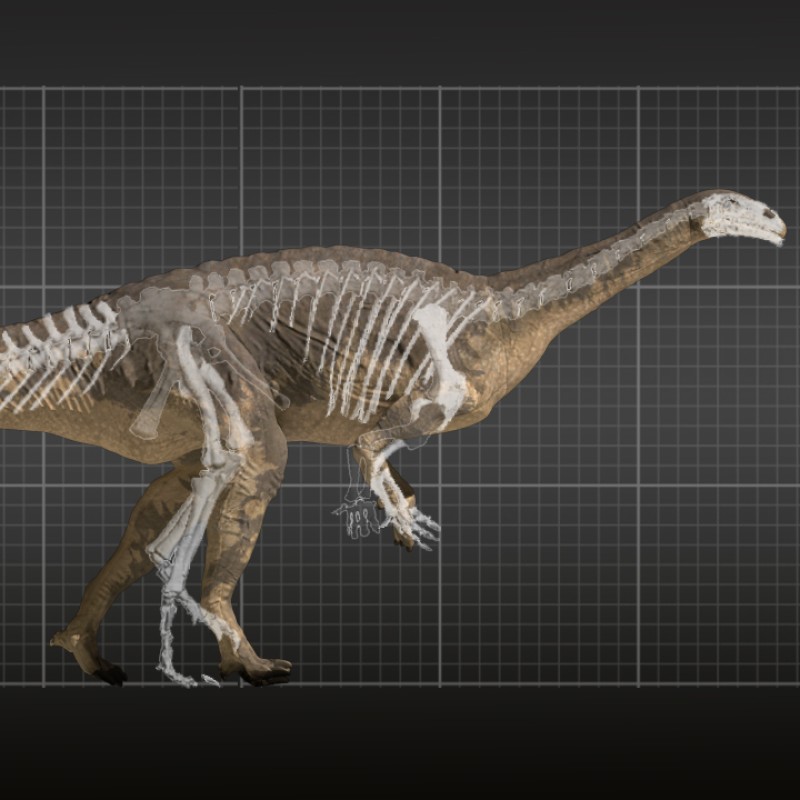Dino with whiptail: New study reveals potential defense strategy of Plateosaurus
22. May 2025
Was the Plateosaurus better armed than previously thought? A new study provides surprising clues: The herbivorous
dinosaur, which lived around 215 to 205 million years ago in the late Triassic period, may have actively used its long tail
for defence – similar to some lizards today.
The research team led by Thomas Filek (University
of Vienna & Boku Vienna) and Ursula Göhlich (Naturhistorisches Museum Wien) analysed an exceptionally well-preserved fossil
from the Swiss city of Frick, which has been on display at the Natural History Museum Vienna since 2021. The highlight: The
almost completely preserved tail spine with whip-like end allowed for the first time calculations of the impact strength.
“We were able to show that the tail tip could have performed blows of up to 1.6 kilojoules and a reconstructed full tail blows of up to ~174 kilojoules of kinetic energy. Both would have been enough to injure or deter small to medium-sized theropods.”, says Filek.
The researchers compared the anatomy with today's animals such as warans and iguanas, which are known to use their tails specifically for defense.
Despite its impressive physique, the Plateosaurus had no bone shells or horns – the more exciting the possibility of active defence. According to the authors, it is also conceivable to use the tail to defend the territory or to protect the offspring.
The findings broaden understanding of the behavior of early dinosaurs and highlight how much can be extracted from a single, well-preserved fossil.
The Plateosaurus can be seen in the Natural History Museum Vienna in Hall 8.
Filek, T., Kranner, M., Pabst, B. & Göhlich, U.B. (2025): Tail of defence: an almost complete tail skeleton of Plateosaurus (Sauropodomorpha, Late Triassic) reveals possible defence strategies. Royal Society Open Science 12: 250325
https://doi.org/10.1098/rsos.250325
Scientific inquiry note:
Thomas Filek, MA MEd MSc, University of Vienna, Department of Paleontology and Boku University of Vienna, Institute of Zoology
thomas.filek@univie.ac.at or thomas.filek@boku.ac.at
Tel.: +43 69917505725
https://orcid.org/0000-0002-4447-0878
Priv.-Doz. Dr. Ursula Göhlich, Research assistant and curator for vertebrate paleontology, geological-paleontological department, NHM Vienna
https://www.nhm-wien.ac.at/en/ursula_b_goehlich
Tel.: +43-1-52177-257 | ursula.goehlich@nhm.at
https://orcid.org/0000-0002-9553-3488
General request for information:
Mag. Irina Kubadinow, Head of Press Department, Press Spokesperson, NHM Vienna
https://www.nhm.at/irina_kubadinow
Tel.: + 43 (1) 521 77 – 410 | irina.kubadinow@nhm.at
“We were able to show that the tail tip could have performed blows of up to 1.6 kilojoules and a reconstructed full tail blows of up to ~174 kilojoules of kinetic energy. Both would have been enough to injure or deter small to medium-sized theropods.”, says Filek.
The researchers compared the anatomy with today's animals such as warans and iguanas, which are known to use their tails specifically for defense.
Despite its impressive physique, the Plateosaurus had no bone shells or horns – the more exciting the possibility of active defence. According to the authors, it is also conceivable to use the tail to defend the territory or to protect the offspring.
The findings broaden understanding of the behavior of early dinosaurs and highlight how much can be extracted from a single, well-preserved fossil.
The Plateosaurus can be seen in the Natural History Museum Vienna in Hall 8.
Filek, T., Kranner, M., Pabst, B. & Göhlich, U.B. (2025): Tail of defence: an almost complete tail skeleton of Plateosaurus (Sauropodomorpha, Late Triassic) reveals possible defence strategies. Royal Society Open Science 12: 250325
https://doi.org/10.1098/rsos.250325
Scientific inquiry note:
Thomas Filek, MA MEd MSc, University of Vienna, Department of Paleontology and Boku University of Vienna, Institute of Zoology
thomas.filek@univie.ac.at or thomas.filek@boku.ac.at
Tel.: +43 69917505725
https://orcid.org/0000-0002-4447-0878
Priv.-Doz. Dr. Ursula Göhlich, Research assistant and curator for vertebrate paleontology, geological-paleontological department, NHM Vienna
https://www.nhm-wien.ac.at/en/ursula_b_goehlich
Tel.: +43-1-52177-257 | ursula.goehlich@nhm.at
https://orcid.org/0000-0002-9553-3488
General request for information:
Mag. Irina Kubadinow, Head of Press Department, Press Spokesperson, NHM Vienna
https://www.nhm.at/irina_kubadinow
Tel.: + 43 (1) 521 77 – 410 | irina.kubadinow@nhm.at




